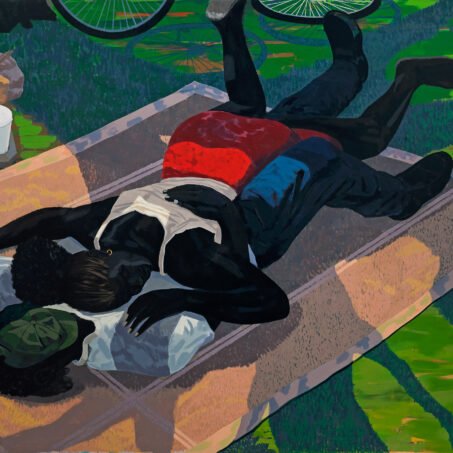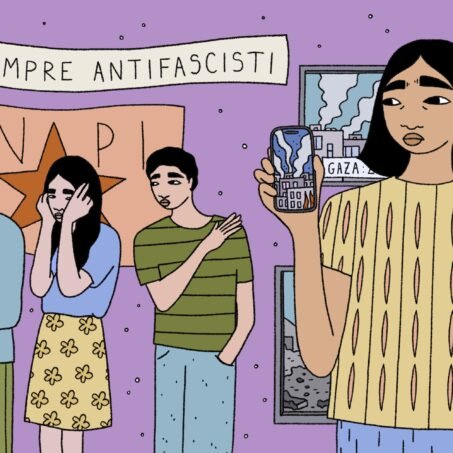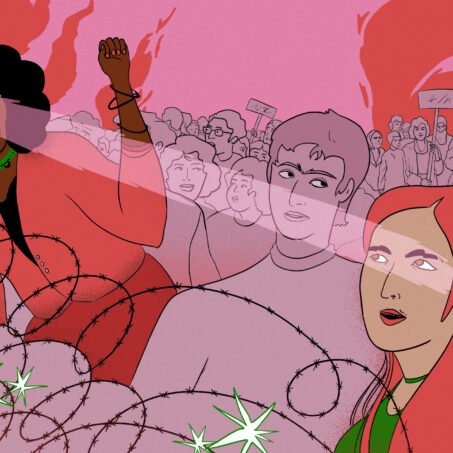In our Twitterfied post #MeToo society, we’ve been trained to understand sexual assault as black or white, the villain and the victim, canceller and cancelee – and without this binary, it feels like there can be no justice.
MANIC, a new show by Raina Greifer, acknowledges that many of us have experienced sex which sits in-between. When the framework is black and white, it leaves no space for us to process anything else – and a lot of us have experienced this ‘anything else’.
“We don’t have a lot of representation of nuanced and complex storytelling when it comes to stories of sexual assault, and sexual violation”, says Raina when we meet to chat all things MANIC on zoom. “How can people adequately consent to things when we don’t have a reference point in pop culture of people giving verbal consent? It feels ridiculous to be teaching people that that’s the way you consent to sex when like, you don’t see that in Grey’s Anatomy.”
A 23-year-old theatre maker from Bristol, Raina has been using puppetry, poetry and PowerPoints to create a much-needed space to embrace these nuanced questions with a bit of fun. An unlikely comedy-cum-puppet show, their new show MANIC looks down the barrel at questions the #MeToo movement scrambled to find satisfactory answers to.

When #MeToo doesn’t work
“The Aziz Ansari situation was a good example of what we’re seeing more and more of,” says Raina. If you don’t remember, early in the #MeToo movement, a woman published an account of a sexual encounter with comedian Aziz Ansari. It didn’t fit into the framework of clear assault like the many stories circulating at the time. The writer recounted verbal and non-verbal cues initially of consent, and then increasingly her discomfort – to which Aziz reportedly kept trying to initiate sex, but eventually called her a cab home.
I remember hearing this case in the rise of #MeToo and it was the first time that I wasn’t entirely comfortable with being judge, jury and executioner. What happened to this woman was familiar and deeply wrong. She felt unsafe and had a right to change her mind. But in a pre-#MeToo culture where men are taught women ‘play hard to get’, this encounter didn’t feel equivalent to the likes of Harvey Weinstein.
Being a young feminist, I was afraid to voice this. It felt like asking any questions might be bad feminism and I’d be failing my gender, but also that this required a different – more nuanced – response.
“Most of us will have known people who would have been in that situation. My interpretation is: he fucked up. Out of ignorance,” says Raina, acknowledging what we so often ignore. “You can’t always blame someone for not knowing something. And that doesn’t make it right or that it should have happened – but given how sex functions in a sexist society, it’s not surprising and sadly extremely common. The story required a more nuanced framework than we had at the time, it made people uncomfortable, so it disappeared, and we didn’t learn how we might navigate these situations.”
I am reminded of all the creepy behaviour my friends and I forgave men of when we were younger – because we didn’t even really know what it meant. We knew it wasn’t welcome, but we didn’t have the words to articulate why. Sexual assault was being attacked by a stranger in the park. It didn’t happen quietly, gradually, briefly, from people you do know. It was just men being drunk, or silly, or over-friendly.
Sex under patriarchy
For devising MANIC, Raina has been thinking about how we place these tragically common encounters into a larger framework, to understand what this can tell us about society and sex. “How can women consent to sex when female pleasure isn’t discussed? How do we know what we’re consenting to? Sex is beyond just the encounter,” Raina explains.
“Sexuality by Catharine MacKinnon, which is what my latest play MANIC is based on, talks about how sex is constructed and defined within a sexist society, therefore, sex is inherently sexist. Until we have a framework that overcomes and revolutionises sexism, consent models aren’t doing anything to address that. And that’s why they fail us so often.”
Raina has been devising theatre that takes time to look at the contradictions and complexities when navigating an encounter such as this.
“A lot of the work for MANIC asks how do you talk about sexual violation without necessarily placing blame? Sometimes we need to blame people, validation can be essential. But I also think that it’s as important to allow space to say yes, that was violating, what now?”
At first, this threw me. In these instances, my initial reaction is that someone must always be held accountable.
“Drunk sex is a normal thing, right?” Raina elaborates thoughtfully. “But people can’t properly consent when drunk. And those things exist simultaneously. What we need is space to say that all this is true. We must ask ‘How do you give space for people to feel their feelings while acknowledging that holding people to account isn’t always possible?’”
These are questions that sit in the back of your mind, impossible to voice because in asking them it feels like you might need an answer. And there might not be one. If it feels like admitting defeat when you can’t name a culprit for the crime, maybe it’s easier to pretend nothing happened.
“I am trying to ask the hard questions no one is asking: is it okay to say I was violated in these situations?”
Finding the words
The idea that consent doesn’t begin in the bedroom is gaining interest – there are a million influences every day that impact how and why we make decisions. Michaela Coel’s 2020 dark comedy I May Destroy You, a ‘fearless, frank and provocative series exploring the question of sexual consent” was met with critical acclaim and has a sky-high 98% on Rotten Tomatoes.
“The viral New Yorker short story Cat Person did a good job of talking about the incredibly complex implications of sleeping with someone where you don’t know if you necessarily want to,” explains Raina. “The depth of that feeling and how normalised it is, how much we apportion blame to ourselves. What is that grey area?”
In writing this piece I re-read Cat Person, and was chilled once again at how much it resonated. These instances don’t map onto the clear victim/perpetrator binary, and yet acknowledge how traumatic and confusing sexual encounters can be. Listicles online tell us, ‘You can always change your mind halfway through’, but what does that look like in reality? Under patriarchy, difficult. You feel sick and horrible if you stay, and sick and embarrassed if you leave.
Raina credits the popularity of these pieces to their “clear articulation of a complex and horrible experience that so many women have had, and we never acknowledged.”

Join our mailing list
Sign up for shado's picks of the week! Dropping in your inbox every Friday, we share news from inside shado + out, plus job listings, event recommendations and actions ✊
Sign up for shado's picks of the week! Dropping in your inbox every Friday, we share news from inside shado + out, plus job listings, event recommendations and actions ✊
“Before Cat Person, I had no language to talk about any of my experiences.”
MANIC is a product of Raina working through these questions for herself around experiences they had at high school age with a man who was in university, with a four or five-year age-gap. “I experienced some PTSD after the relationship and just didn’t have the language to talk about why.
“In my puppetry course, I devised a piece where I performed a poem to him on stage, listening to me. It was me trying to have a conversation with him, about how the effects of loneliness might impact his behaviour around younger people.”
She continues: “I was working out a dialogue with him in my imagination, to figure out why he couldn’t understand me.”

Laughter and trauma
In doing this work, Raina became excited about opening up this conversation around bad sex in a way that you might actually talk about it to your friends – with laughter.
“In theatre, you have this abundance of solo femme shows that culminate in an assault. I was interested in exploring the bigger picture. I exist more than just a lived experience of assault, yet it’s also a big part of who I am.”
According to Rape Crisis and Galop, 1 in 4 women experience sexual assault in their lifetime, 1 in 18 men, and nearly 7 in 10 LGBT+ people. I wonder how those stats would look if society considered the grey area as assault. How many people don’t feel comfortable to voice their experiences because it feels like it ‘doesn’t count’, like it ‘wasn’t serious enough’, or can’t face the conversations and repercussions that come with it.
Those with lived experiences of assault often fear that the encounter will come to define them, and Raina wanted to own this: “It is not my identity, my life is filled with joy. MANIC centres hope, joy and fun, but doesn’t shy away from the complex power dynamics inherent in these experiences.”
For those writers interested in navigating the tightrope walk that is comedy and trauma, I ask Raina for their advice from devising and touring MANIC: “I made sure my sex life was not the punch line. This easily veers into self-deprecation of ‘I’m laughing at myself because I’m uncomfortable right now’. I kept overplaying bits, like *spoiler* the burlesque sequence because I felt silly and wanted to get ahead of people laughing at me. No! That isn’t nice for anyone, I want to share funny little bits from my life around the sex.
“It’s about deeply considering where the punch lines are and who they serve.”
Chatting with Raina, hearing about their process and revisiting some of these pieces of writing is simultaneously comforting and uncomfortable. There are these experiences which sit at the back of your brain because you don’t quite know what to do with them, how to process them. But they are valid and maybe the fear is that if we name them, we have to do something about it, defend our stories when we’re too tired or unsure of ourselves. Maybe sometimes it’s okay just to name them, to hold space for them, find humour and community, and turn our attention to a wider society which silences us.
“The best feedback I’ve had on MANIC has been wow, I really thought that would be more harrowing.”
You can catch MANIC at Theatre Deli on 15th September.
What can you do?
Check out Raina’s reading list and show recommendations:
- Read: Cat Person, Kristen Roupenian
- Read: Tomorrows Sex Will Be Good Again: Women and Desire in the Age of Consent, Katherine Angel
- Watch: Nannette, Hannah Gadsby
- Read: the many brilliant works by feminist activist Catherine A Mackinnon
- Check out the shows of Louise Irwin and Bryony Kimmings
- Get tickets for MANIC now!
- Find out more about Raina Greifer HERE
- Keep up to date with Raina Greifer HERE
- Other articles you may find interesting








